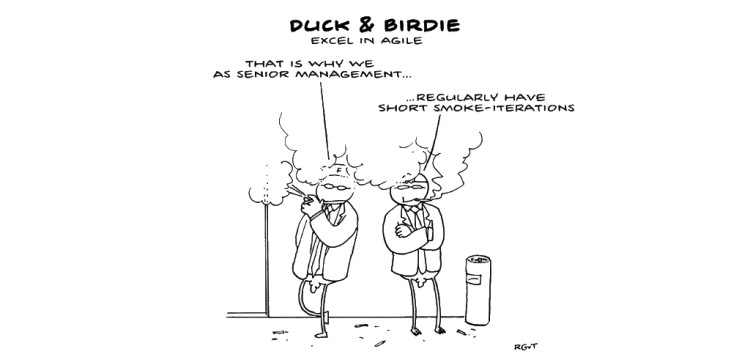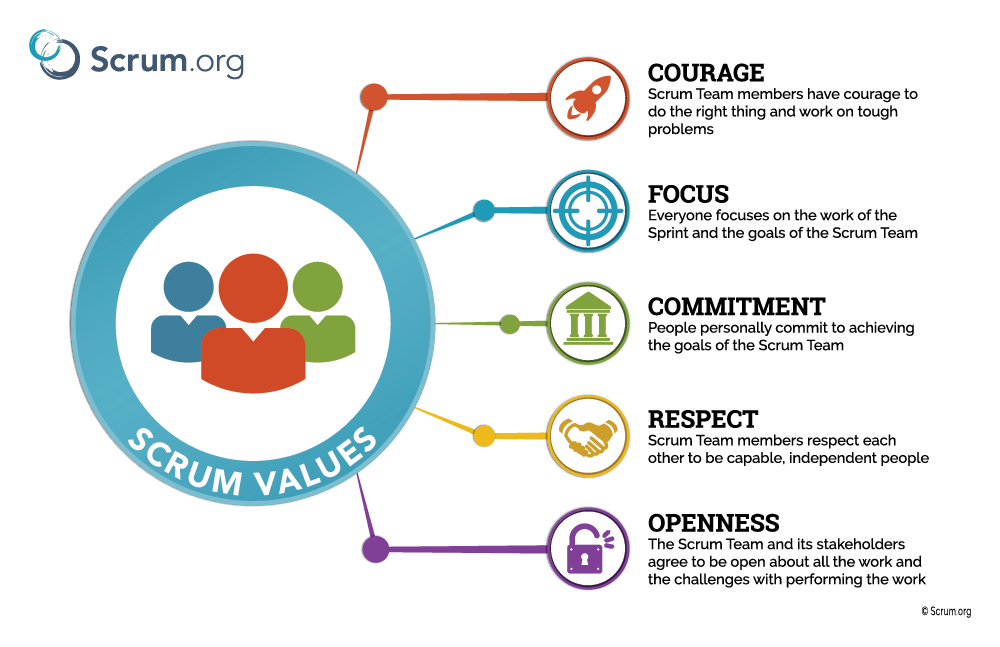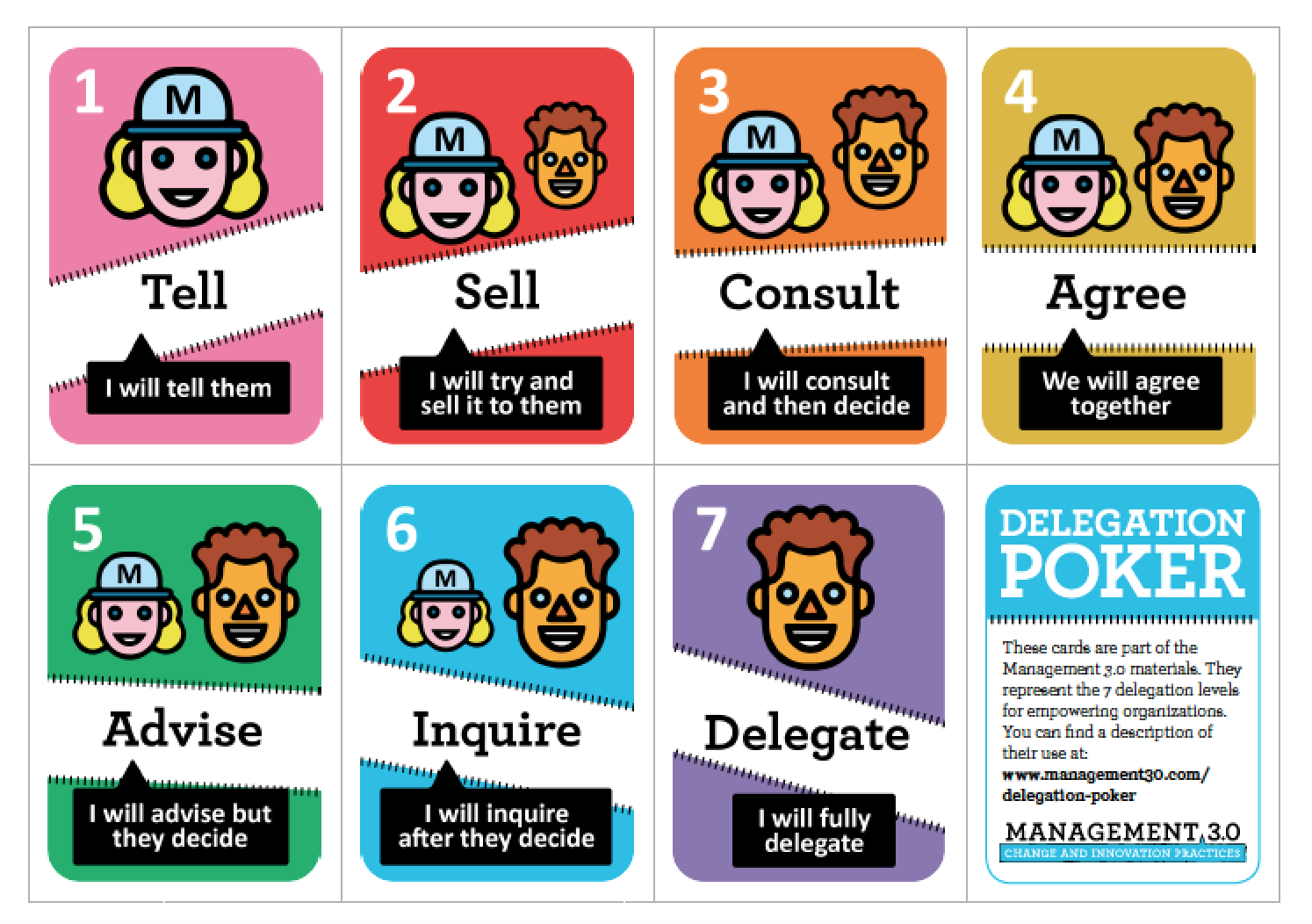
How can Management benefit from the Scrum values?
This blog is the first in a miniseries related to Agile management topics; all featuring Duck & Birdie as teaser. Today’s topic is the managerial attitude in an Agile environment matched against the Scrum values. Many development teams nowadays use the Scrum values as an important mindset in their daily routine. It makes sense to apply these values also to the organization level above the teams, still the domain of managers. By doing so, I hope to trigger reflection for managers, or anyone involved in steering agile teams, without smoking management out ?
Where does the need for an agile management attitude derive from? In many organizations Agile adoption was a bottom-up movement. A few teams started experimenting with Scrum or XP and soon the Agile oil stain was spreading throughout the organization. Currently, complete organizations are transformed into Agile driven structures from top to bottom and back up again. These organizations, but especially the teams, require a different management style. This is where an agile attitude towards managing teams becomes indispensable. The behaviour I encourage managers to show is on the one hand vision and leadership (including being able to make the necessary ‘judgement calls’). And on the other hand, the ability to create the right climate for teams to self-organize and solve problems. In my experience it is hard for (senior) managers to find a good balance between servant leadership – acting according the Scrum values – and having a more direct / autocratic leadership style. Especially when things get tense and the stakes are high.
Let’s illustrate the difference between servant and direct leadership in an example. If, when and how you intervene as manager – in case a commercially important deadline is under threat of non-delivery – is distinctive. Probably one would say: “It depends”. Yet, it is striking to see how many managers will fall back into ‘old school’ habits of completely taking over, bringing in the well-known-go-to guys (heroes) and demanding daily updates from a team lead. Although there might still be cases where this is the best temporary approach, it comes with a risk. If you don’t coach teams to determine root causes or fail to make sure they learn and come out of these situations in a better shape, a lot of organizational value is unfulfilled. In fact, the exact opposite behaviour is encouraged. The go-to-guys remain the organizational heroes and no one is stimulated to really change something because top down interventions remain the norm.

Applying the Scrum values to the managerial level
Now we take the Scrum values into account. In the said example, Respect and Openness – or the lack thereof – immediately come to mind. Respect towards the teams and professionals (including their agreed upon way of working) and Openness to existing challenges but also to possible solutions. Courage is found in placing your trust in the people to do the right things and to help them to improve. Root causes – in aforementioned case a commercial disaster – are often founded in unrealistic goals from the start or vague promises that were made before the teams were even aware. So, it may take Courage and Commitment to address these as a manager in your own organization. Following the Scrum values may prevent you to fallback into old behavioural ‘steering patterns. Let’s briefly explore three key focus areas of managers.
1. Leading by example. An important managerial aspect is leading by example; show your teams that a promise means something. That the suggestion of you willing to help them is not an empty one. Even better, go the extra mile for your people and teams. Being an example also resonates with being involved. Know what is going on and why. You are aware of the biggest impediments the teams are facing, you also know what the plan is to fix them and what your role is in it. You know this not from a bi-weekly status update from a team lead. No. You know this because you were at the Review, possibly the Retrospective and you got the latest at this morning’s Stand ups. You show Respect for the Scrum framework, Focus on team goals and the Commitment to help and serve them.
2. Defining organizational structure. Defining the actual structure of the organization is a classic management responsibility, including establishing the rules on the development playground. In every organization there are boundaries and contexts that determine the observed self-control or freedom that teams have. It is important to have a clear common understanding on these boundaries and levels of freedom. (See Jurgen Appelo’s delegation poker in Managing for Happiness as a tool to discuss ideas with your teams and establish shared understanding.) This includes making sure the teams have capacity available to improve, to experiment and to work on a learning organization. Openness and Respect of the rules and the process of getting the rules in place, Courage to leave room in packed backlogs and keeping Commitment when situations are tense.
Delegation poker

3. Caring for (managing) people. Show people they matter and that they are the company’s major asset instead of just resources. This means making time for them, enough time. Instead of being always late for personal appointments or worse, cancelling them more than having them. In other words: having Respect and Commitment for the well-being of your colleagues. Sometimes urging people to go home instead of stressing a deadline. It would be great if the leaders of the future coach their teams to act with these values in mind and at the same time allow them to make mistakes. Courage also means to be able to have the ‘difficult talks’ with people and on the other side being transparent about your own mistakes or short comings.
These are just three of the important trades managers need to employ. When you keep the Scrum Values in mind an Agile attitude feels like a natural thing to do. Luckily, I have witnessed a few excellent managerial examples. People that have a genuine interest in people, are a little geeky on technology and have fundamental organizational antennas. Don’t make the mistake to think these men and women were soft. They were honest and clear. Did they make mistakes? Yes, and they were the first to acknowledge this. And that is great Courage!
Duck & Birdie and more comics.
These comics are originally called “Fokke & Sukke” and created by the Dutch team: illustrator Jean-Marc van Tol and writers John Reid and Bastiaan Geleijnse. See: Fokke & Sukke for more information.
If you are looking for more comics on Agile you can check out: Dilbert still struggles working Agile & Dilbert saves the Agile day and see how Dilbert is overcoming it all.
[1] http://www.foksuk.nl/ & https://nl.wikipedia.org/wiki/Fokke_%26_Sukke
[2] https://guntherverheyen.com/2013/05/03/theres-value-in-the-scrum-values/
[3] https://www.scrum.org/resources/scrum-values-poster
[4] https://management30.com/practice/delegation-poker/
[5] https://www.agitma.nl/managing-for-happiness-jurgen-appelo
Filled Under: agile,Geen categorie,scrum,software development Posted on: 5 April 2020
